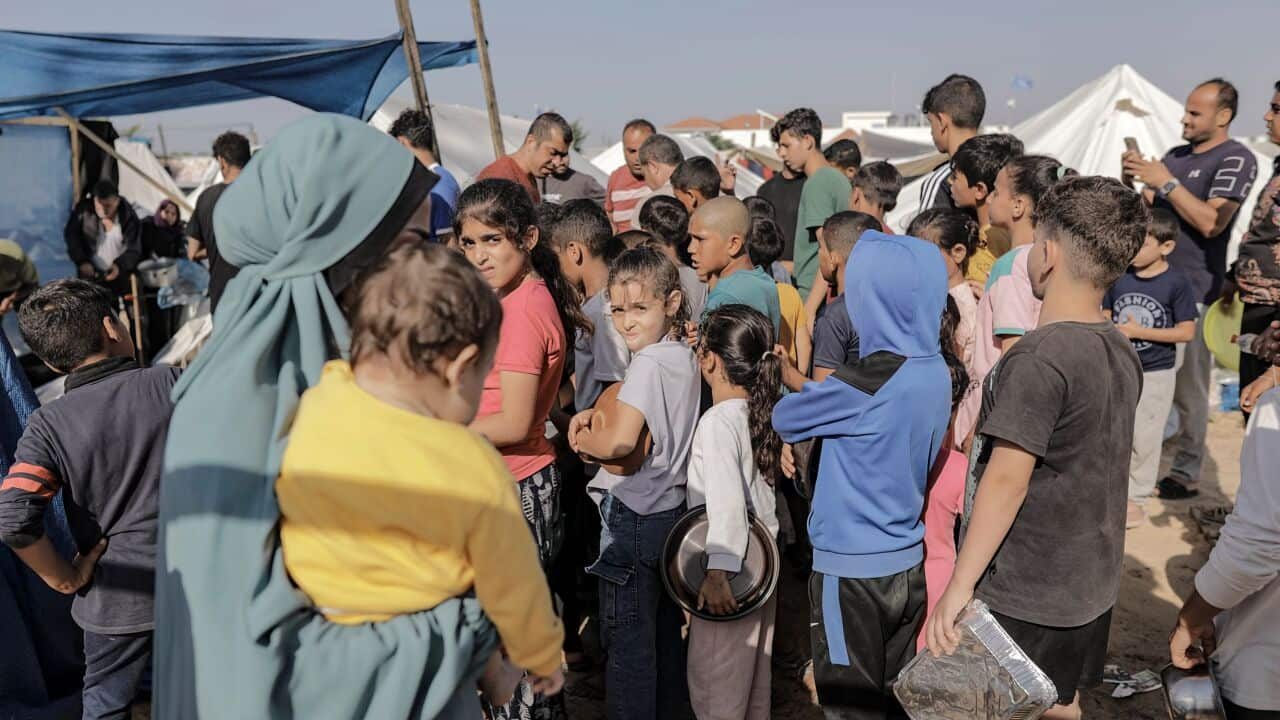TRANSCRIPT
It is now been 20 days since Israel bombarded the Gaza Strip in response to the October 7 Hamas attack on Israeli communities.
American-Palestinians Helal Kaoud and Shamiss Kaoud are among people watching events from afar, concerned about family members directly impacted by the ongoing war.
Helal describes their situation.
"On September 25th, my dad, my 20-year-old brother and four of my uncles, who are all US citizens, went to visit our family in Gaza. Despite my mother's pleadings otherwise, my dad promised my mom it was safe and that they would be back in a month. It was my dad's first trip back home in over 20 years and my brother's first trip out of the country as an adult. Two weeks into their vacation, the attacks started and they are no longer safe. Now our conversations have shifted from daily vacation updates to proof of life updates. We hold our breath every day waiting to hear from our family, to hear that they made it through Israel's airstrikes to see another day."
Shamiss Kaoud says essential supplies, including medication, are critically low in Gaza.
And she is concerned about her dad's health.
"Our father is 68 years-old and has a heart condition. He has a pacemaker and a defibrillator implanted in his chest to resuscitate him if his heart stops. He is running out of medication that he relies on daily to keep his heart functioning properly. So not only is he worried about surviving the airstrikes, but he's also worried whether or not his medication will last. It is imperative that he gets back home as there is no way for him to get any of this medication."
Israeli officials say since October 7 Hamas has killed some 1,400 people, including children, and have taken more than 200 hostages - some of them infants and seniors.
Authorities in Gaza say more than 6,500 Palestinians have died since Israeli strikes began.
The war is the deadliest of five Gaza wars for both sides.
Israel's Prime Minister Benjamin Netanyahu has said Israeli troops are still preparing for a full ground invasion of Gaza.
Defense Minister Yoav Galant says Israel has no choice but to win the current war.
"Something like that hasn't happened to the State of Israel in its 75-years of existence. What will happen in the next 75-years very much depends on the achievement - that we will strive for in this fight - and that’s why I am telling you, we have no other choice - and we will win, because we have no other choice, it’s us or them."
Protests are erupting around the world in response to the violence.
Several hundred protesters gathered outside a venue in Brussels where European Union leaders were meeting, calling for those inside to go further in their efforts to halt Israel's bombing campaign.
Demonstrators outside the United Nations in Geneva set-up more than 200 empty chairs and strollers, to call for the release of Israeli hostages abducted by Hamas.
In Israel, Hadas Kalderon waits anxiously to hear about members of her family held hostage.
"Five members of my family have been kidnapped, five. My mum, my niece, two children, Erez, Sahar and their father, Ofir. A week ago I was told, I got information that my mother and my niece had been murdered. I didn't even have the time to grieve and to go to the funeral."
Relatives of Israeli hostages met with officials in Geneva last week to plead for their release.
The Palestinian Ambassador to the U-N in Geneva, Ibrahim Khraish, says he supports freeing them.
"I'm in favour of releasing all civilians, all prisoners, from both sides. You think that we are happy with that? No. We want them to be released soon, tomorrow, if there is any mediation tool. All, the Palestinians and the Israelis, and the foreigners, there are some foreigners.”
The United Nations Relief and Works Agency for Palestine Refugees in the Near East says it may soon have to shut down operations in Gaza if no fuel reaches the Hamas-ruled territory.
The agency's chief spokeswoman Juliette Touma says fuel is needed for a range of essential services.
"We need fuel for the UN cars, we need fuel for the trucks to be able to go and bring the little supplies that are coming in. We also need it for water pumping station. We also needed desalination stations. We needed for the bakeries that we've been supporting. We need it for the vehicles that have been transporting wheat flour to the bakeries in Gaza. So, all of this is on the brink and we might not be able to continue to do any of this."













